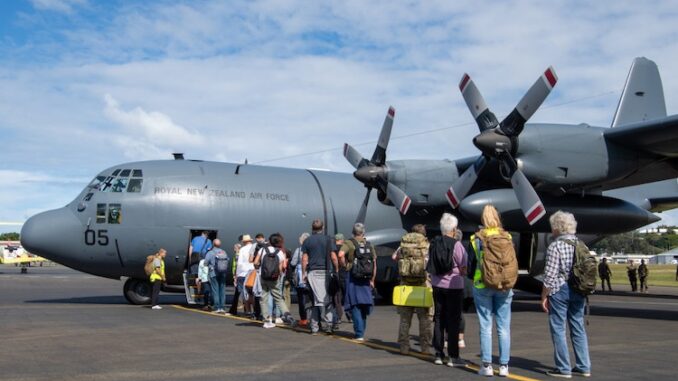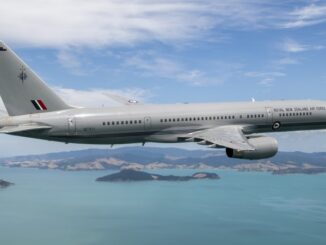
The NZDF needs to be a credible, combat-capable force that can work closely with international partners using assets and equipment that operate effectively and communicate securely, writes Defence Minister Judith Collins.
As Minister of Defence I have recently been humbled to attend several commemoration services in Europe, representing the people of New Zealand.
The first was on Anzac Day in Belgium, where a memorial at Buttes New British Cemetery near Passchendaele pays tribute to 378 New Zealanders who died there during World War I and have no known grave. More than 12,000 members of the New Zealand Division are buried in 430 cemeteries like this across Belgium, France and the United Kingdom. It is astounding.
The second was in May in the Italian town of Cassino, where 343 New Zealanders were killed over four months of bitter, close-quarter fighting during World War II. My own father, Percy Collins, fought there, so I know all too well the scars, both physical and mental, that this campaign left on those lucky enough to survive.
The armed services have played an indelible role in New Zealand’s history and, looking ahead, I am sure the New Zealand Defence Force (NZDF) will continue to do so.
Read it in the digital edition…
Defence today
New Zealand is facing the most challenging global environment in decades, something that my international counterparts also shared with me during my recent travels.
International rules and norms are being challenged by states and actors around the world. We only have to look at events in Ukraine and the Middle East to see how rapidly peace and stability can deteriorate.
As always, NZDF personnel are on the frontline of our national security. I have been deeply impressed with their capability, training and commitment to service. Without hesitation they deploy to domestic or international emergencies to help communities in need, often putting their own safety at risk.
Just last month, NZDF made seven flights to evacuate 225 New Zealanders and 145 foreign nationals from New Caledonia, following an outbreak of violence. Soon after, they were called upon to deliver aid supplies to Papua New Guinea following a landslide that killed hundreds of people.
Gearing up for the future
The Defence Force has been facing a number of challenges in recent years, particularly personnel attrition and ageing equipment.
That is why the Government committed $571 million towards NZDF pay and projects in Budget 2024.
$163 million has been allocated to boost NZDF salary packages to ensure we retain their excellent services and expertise.
$408 million has been set aside for seven defence projects, subject to Cabinet’s approval of individual business cases. It is critical NZDF personnel operate modern, safe and fit-for-purpose equipment.
Budget 2024 projects include:
- Beginning the replacement of the NZDF’s most frequently deployed vehicles, the Unimog and Pinzgauer fleets. Replacement vehicles will have integrated communications that enhance interoperability with Defence partners;
- the next phase of an upgrade to the NH90 helicopter navigation systems and radios;
- upgrading the regional supply facility and logistics model at Linton Military Camp;
- modernising devices and productivity tools;
- upgrading some digital services;
- improving national maritime domain awareness; and
- the construction of 35 new homes for the families of Defence personnel based at Devonport Naval Base.
But Budget 2024 is not the last you will hear from me on investment in our Defence Force. Options for an updated Defence Capability Plan are underway. The plan, once approved, will help shape investment decisions for Defence until 2040.
Shoring up partners, old and new
New Zealand’s security and prosperity are inextricably linked to broader regional and global security and prosperity – 80 percent of our annual exports go to the Indo-Pacific.
In an increasingly unstable world, NZDF needs to be a credible, combat-capable military force that can work closely with international partners, using assets and equipment that operate effectively and communicate securely.
I have taken every opportunity to meet with our defence partners, to understand their perspectives, and to demonstrate that New Zealand is internationally engaged and willing to step up to respond to new and emerging threats. International cooperation and collaboration is critical.
Just recently I attended the Shangri-la Dialogue in Singapore to discuss security issues with many of my counterparts from around the world. Our Defence partners reiterated the importance of measures which help to build trust and confidence between regional partners and enhance military interoperability.
That is why New Zealand supports a broad range of international partnerships, such as the Five Power Defence Arrangements, which have security benefits and aligns with New Zealand’s own interests and values.
Interests and values, I note, that have barely changed since last century’s two World Wars. Whilst visiting those cemeteries in Belgium and Italy, I could not help but reflect on the liberal democratic principles those soldiers from countries around the world fought for. They are still fundamental to New Zealand society today, and to the societies of our international partners.
As it was then, no one country can respond to the challenges of our time alone.









